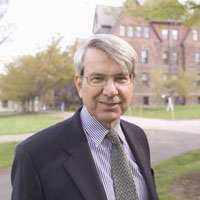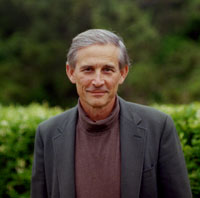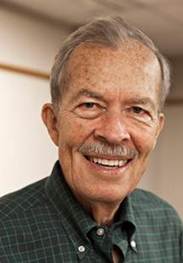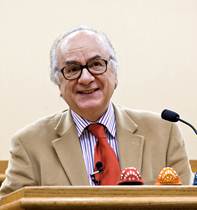
Many have suggested that theory is dead. As chair of the American Comparative Literature Association Committee awards the Rene Wellek Prize for the best book in literary theory, I will report on the current state of literary theory as exemplified by some sixty books publishers have submitted for the prize. Though there is considerable uncertainty about what counts as theory these days, the books from the past two years testify to a stronger and more varied field of theory than the yield from two years ago.
Jonathan Culler is Professor of English and Comparative Literature at Cornell University and an internationally recognized scholar of literature and literary theory. His publications include The Literary in Theory (Stanford, 2006); Literary Theory: A Very Short Introduction (Oxford, 1999); Framing the Sign: Criticism and Its Institutions (Oxford, 1988); and Flaubert: The Uses of Uncertainty (Ithaca, 1985).

Uses and Abuses of Environmental Memory
Lawrence Buell
Tuesday, April 20, 2010
University Club, Indiana Memorial Union
How can the arts of memory counteract the inertial effects of what psychologist Peter Kahn, Jr. has called "intergenerational environmental amnesia"? The lecture seeks to offer a series of general reflections in response to key questions such as: How much reliance is to be placed on memory as carrier of environmental understanding and thereby as stimulus to environmentalist intervention? To what extent can memory–variously defined–be seen as a resource for reenvisioning (and renegotiating) the relation between human and other-than-human realms in an era of environmental crisis?
Lawrence Buell is the Powell M. Cabot Professor of American Literature, Harvard University, and one of the most prominent literary and cultural critics writing today. His interests include environmental(ist) discourses, issues of cultural nationalism, and comparatist approaches to American literary study including transatlantic and postcolonial models of inquiry. He is an expert on the 19th century, particularly on the antebellum era. Among his books are: Literary Transcendentalism (1973); The Environmental Imagination: Thoreau, Nature Writing; Formation of American Culture (1995); Writing for an Endangered World: Literature, Culture, and Environment in the United States and Beyond (2001); Emerson (2003); and The Future of Environmental Criticism (2005). In 2001 Buell's Writing for an Endangered World was awarded the Popular Culture and American Culture Associations' Cawelti Prize. Emerson won the 2003 Warren-Brooks Award for outstanding literary criticism. In 2007, Buell won the Jay Hubbell Award for lifetime contributions to American literary studies.

Health and Health Care 2020: Back to the Future?
Wendy Everett
October 6, 2010
4:00 p.m.
Moot Court Room 123, Maurer School of Law
Recent state and federal health reform legislation will dramatically change public and private health policies. These changes will not only alter how health care is financed and delivered but also will have the potential to affect personal choices about our own health behaviors. Dr. Everett will discuss the critical elements of health reform and their short and long term effects on individuals and society at large.
Wendy Everett, Sc.D. is President of the New England Healthcare Institute (NEHI) and one of the leading health care policy experts in the US today. Prior to her work at the NEHI, she held numerous executive positions at high-ranking national foundations and health organizations. Everett is an expert in health policy and its legislative processes; she has been in the front lines of health care reform and an active participant in the health care debates for over thirty years.

Trophic Cascades and Caughley's Declining Population Syndrome
John W. TerborghOctober 26, 2010
Moot Court Room 123, Maurer School of Law
This lecture discusses Graeme Caughley's enigmatic "declining population syndrome" in the light of trophic cascades. Trophic cascades are destined to become the core principle of conservation science and, indeed, of all ecology. In addition to discussing the relevant concepts, Terborgh presents illustrative examples from his own research and that of others.
John W. Terborgh is James B. Duke Professor of Biology and Co-Director of the Center for Tropical Conservation at Duke University, as well as a member of the National Academy of Sciences. For the past thirty-five years, has been actively engaged in tropical ecology and conservation issues and is an authority on avian and mammalian ecology in neotropical forests. In 1992 Terborgh was awarded a MacArthur Fellowship in recognition of his work in tropical ecology and, in 1996, the National Academy of Sciences Daniel Giraud Elliot Medal for his book on Diversity and the Tropical Rainforest.

Sumak Kawsay (good life) or Sustainable Development? Refounding the State and the Economy in the New Constitutionalism of Latin America
Boaventura de Sousa SantosNovember 8, 2010
Boaventura de Sousa Santos is Professor of Sociology in the School of Economics and Director of the Center for Social Studies at the University of Coimbra, Portugal. He is also Distinguished Legal Scholar of the University of Wisconsin at Madison and of the University of Warwick, England. Santos is among the world’s foremost theorists of participatory democracy and of law formation and legal processes. His broad research interests include the social and political aspects of law and globalization, sociology of law and the state, epistemology, social movements, and the World Social Forum. His most recent books are The Rise of the Global Left: The World Social Forum and Beyond (2006) and Democratizing Democracy. Beyond the Liberal Democratic Canon (2005).

